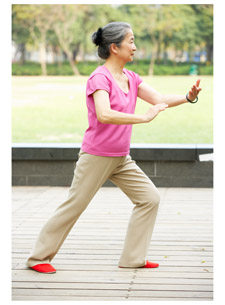 Tai chi is a slow motion, low-impact exercise that promotes physical and mental health and relaxation. It is practiced as an effective exercise for health through a series of flowing, graceful, gentle postures and movements. The gentle flowing movements contain inner power that can strengthen the body, improve mental relaxation and mobilize joints and muscles. Tai chi is an especially suitable therapy for arthritis because of the slow and gentle movements. Here are some of its benefits:
Tai chi is a slow motion, low-impact exercise that promotes physical and mental health and relaxation. It is practiced as an effective exercise for health through a series of flowing, graceful, gentle postures and movements. The gentle flowing movements contain inner power that can strengthen the body, improve mental relaxation and mobilize joints and muscles. Tai chi is an especially suitable therapy for arthritis because of the slow and gentle movements. Here are some of its benefits:
- Tai chi improves balance, strength and flexibility, and lowers the risk of falls. A study from the Oregon Research Institute found that tai chi improved balance and reduced the frequency of falls and risks of falling among older people.
- Tai chi also reduces pain, stiffness and stress. Researchers from Tufts University School of Medicine noted that patients older than 65 with knee osteoarthritis who practiced a 60-minute tai chi class twice a week for 12 weeks showed a significant decrease in joint pain and stiffness compared with those in the control group. They also found the patients in the tai chi group had improved physical function, self-efficacy, depression and health status.
- Both the Oregon and University of California-Los Angeles (UCLA) researchers reported that tai chi improves sleep quality in older adults.
- Other UCLA studies also suggested that tai chi helps people reduce high blood pressure and tension headaches.
- For people who carry extra weight and have a hard time doing exercises without pain, tai chi can be a gentle and safe way to get moving. By practicing tai chi and making wiser food choices, people can start burning calories and losing weight.
Tai chi is an inexpensive, safe, noncompetitive exercise. It can be performed standing or seated. Almost anyone can learn tai chi, regardless of their age or physical abilities. You practice tai chi at your own pace. It requires no special equipment and can be practiced anytime, indoors or outdoors.
There are many styles of tai chi with different forms in terms of physical exertion, appearance and training methods. Each style has its own emphasis on various tai chi principles and methods. Some of the styles are suitable for more athletic people with a martial arts focus. Other styles provide special healing and relaxation. A short form with smaller and slower movements is appropriate for beginners, especially older people.
It is important to find a tai chi form that is suitable for you and can meet your needs and interests. If you have any medical conditions or medications that can cause dizziness, talk with your doctor before starting tai chi.